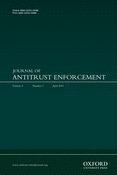-
Views
-
Cite
Cite
Sebastian Peyer, Access to competition authorities’ files in private antitrust litigation, Journal of Antitrust Enforcement, Volume 3, Issue 1, April 2015, Pages 58–86, https://doi.org/10.1093/jaenfo/jnu012
Close - Share Icon Share
Abstract
The growth of private antitrust litigation in the courts of the Member States creates tensions between claimants and competition authorities. Claimants seek access to confidential records held by the authorities while the competition authorities try to maintain the confidentiality of those files. This article analyses the two main access routes to confidential information in the files of competition authorities in the EU. It first looks at access under Regulation 1049/2001 (Transparency Regulation). Then, the article assesses the framework for disclosure in the national courts, analysing the Court of Justice’s Pfleiderer and Donau Chemie decisions, its application in England and Germany, and the changes that are required with the adoption of the Damages Directive. It finds that both access routes tend to favour the protection of authority files and that access-seeking parties face high-legal thresholds for the disclosure of files and leniency documents. It argues that the raised standard for access demonstrates a policy change regarding private antitrust enforcement. EU policy makers and the courts have begun to moderate the principle of effective redress as expressed in Courage and Manfredi. In order to minimize repercussions for public enforcement they reduce the incentives for claimants to bring follow-on damages actions.



